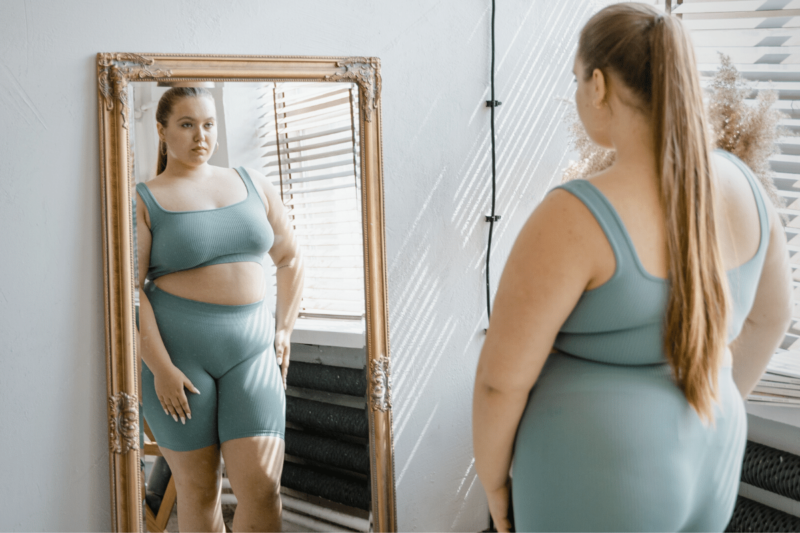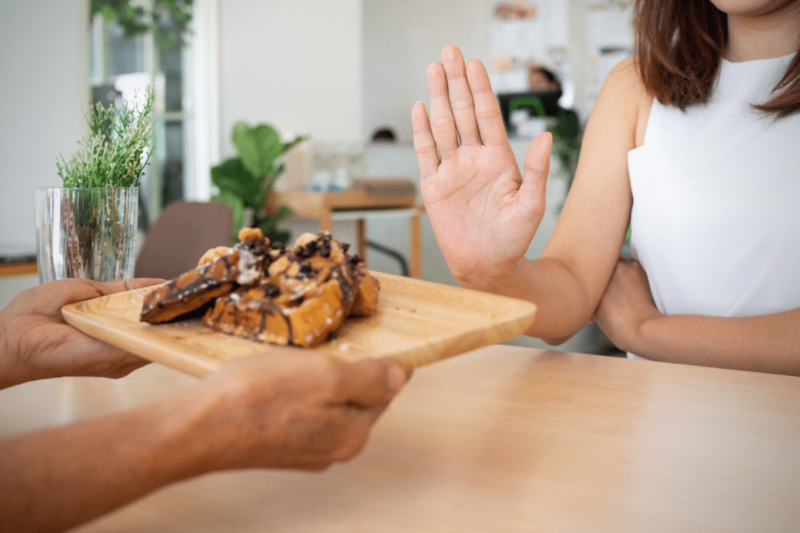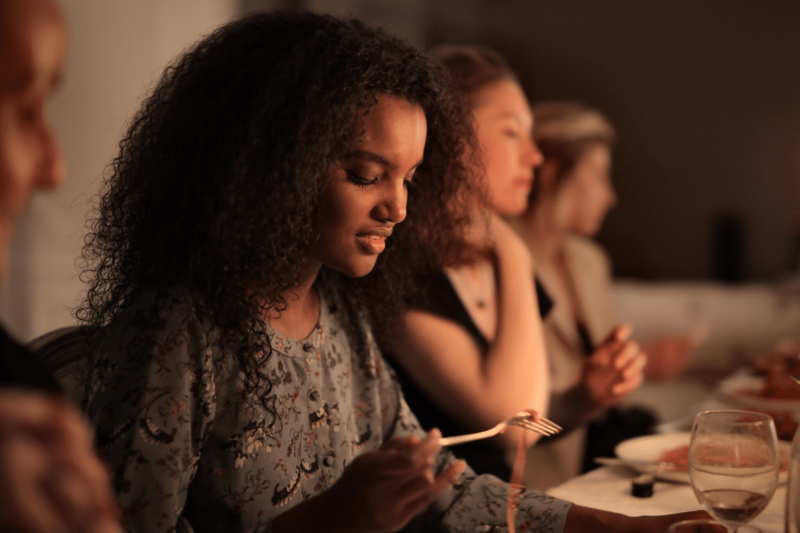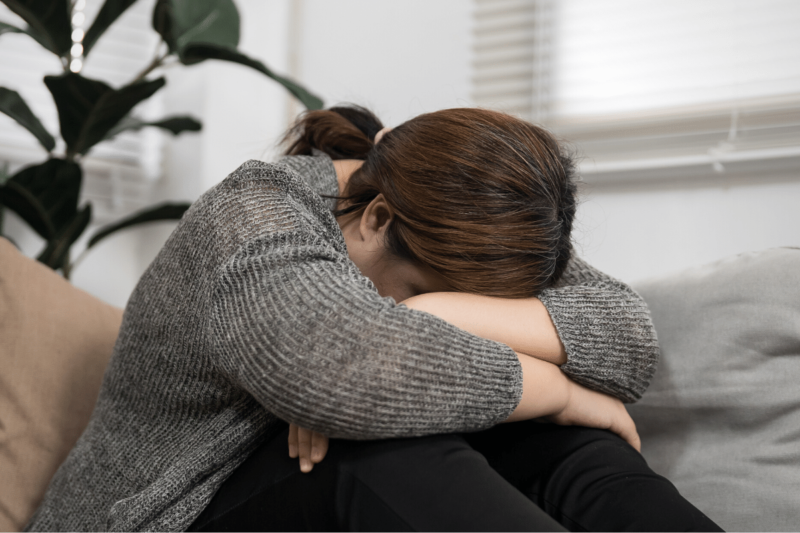
I see so much shame — too much shame — about our bodies (their shape, their size, their functionality) and our food (what we eat, when we eat, why we eat, how much we eat).
If you’re experiencing food and body shame, I want you to know two things:
- One, you haven’t done anything that warrants shame.
- Two, if you are struggling with body image, or your eating habits are causing you distress, then you deserve help, not shame.
Why your “food guilt” is really food shame
Quick, you’ve just eaten a cupcake…what thoughts are running through your head? “Wow, that was really delicious!” or “Why did I eat that? I’m so bad!”
It’s true that some foods are more nutritious than others. That’s an objective fact, with no moral implications. It’s one thing to acknowledge guilt and feel shame because you intentionally ran over someone with your car or you cheated on a test. It’s quite another to feel shame because you ate a cookie. Karla McLaren, author of “The Language of Emotions” says shame is the natural emotional consequence of guilt and wrongdoing. But eating a cookie isn’t wrong, just as eating broccoli isn’t virtuous.
It’s a common belief that shaming ourselves about our less-nutritious food choice, at least a little, will help us stay on track with our nutrition goals, but more often than not it paralyzes us. Research shows that harsh self-criticism about food or body contributes to disordered eating patterns and poor body image, whereas self-compassion has the opposite effect.
A recent New Zealand study found that people who associate chocolate cake with guilt instead of celebration were more likely to have unhealthier eating behaviors and less intention to eat healthy in the future.
What happens when you feel shame about eating something that you’ve decided isn’t healthy? You might end up feeling that it’s not just your food choice that was bad — you might start to feel that you’re bad, too.

The vicious cycle of shame
If you tend to be rigid with your diet, shame may make you more restrictive with your food to compensate for your perceived lapse. If you tend to eat for emotional reasons — as many people do — shame may make you feel even worse, leading you to reach for more food in an attempt to self-soothe, leading to more shame.
It’s a cycle that feeds upon itself. Shame over a perceived food transgression can also simply lead to a “heck with it all” attitude because the damage has already been done.
No one food makes you healthy or unhealthy. It’s about how the multiple food choices you make every day add up. If you regularly eat in a way that is not supporting your nutrition or health goals, despite your best intentions, there’s likely a reason.
Let’s say that you’re having a hard time stopping snacking in the evening between dinner and bedtime — when you’re not even hungry. Instead of succumbing to shame, try being curious. Ask yourself, “What’s really going on?”
Are you bored or tired? Are you stressed or angry? Are you sad or lonely? All of those feelings are legitimate and worthy of attention, but food is at best a Band-Aid for what’s really eating you.
It can be hard to let go of food shame. But it’s far worse to beat yourself up after eating a cookie than it is to eat that cookie, savor every morsel, and think, “Yum.” That kind of mindset may even help you be satisfied with one cookie rather than feeling like you want to devour a whole dozen.

From fat talk to body shame
Do you engage in fat talk – self-disparaging remarks made to other people about one’s weight or body? If you direct this talk towards yourself, it’s a form of self-degradation. Perhaps you criticize your body weight, shape, or level of physical fitness. (“I’m so fat” or “My thighs look huge in these shorts” or “I’m so out of shape…I feel like a big blob.”)
Fat shaming is essentially fat talk directed at someone’s body. This could be your body, or someone else’s body, and it can be either direct (criticizing your own body or the body of the person you’re talking to) or indirect (making comments to your friends about someone’s body when your target isn’t present or can’t hear you). Not surprisingly, this often accompanies diet talk/food shaming, such as talking about:
- Whether a food is “good” or “bad”
- Whether you are “good” or “bad” based on what you ate or are about to eat
- Whether you “should” or “shouldn’t” eat a food
- The diet you’re on (or planning to go on)
Most of my friends are weight neutral dietitians, so I don’t have to deal with a lot of diet talk when sharing a meal. (I do hear a little from certain family members.) But my clients are constantly filling me in on what they have to deal with from women in their book groups or art classes, friends of friends, other teachers in the lunchroom. (I’ve had a number of clients who are teachers, and they inform me that teachers are the worst about this kind of talk.)
Here’s why this is a problem…

Food and body shaming does real harm
Fat talk and diet talk (aka body and food shaming) may seem like benign (non-harmful) behaviors, especially if the person is talking about their own body and their food choices, but they are not benign.
When you criticize someone’s food choices or body – whether the object of that criticism is you, someone you are with, a mutual acquaintance who isn’t with you, or a total stranger – those words have a negative and harmful impact.
Both engagement in and exposure to fat talk contributes to body dissatisfaction, heightens our perception of societal and cultural pressure to be thin, and can push us into being overly invested in our appearance (self-objectification). These factors all erode quality of life, which is bad enough, but they also increase the risk of adopting disordered eating behaviors – or even developing an eating disorder.
Imagine that you are in a larger body (maybe you don’t have to imagine this). You’re sitting with a friend in a smaller body than yours, and she starts going off about how she’s “too fat.” How does this make you feel about your own body? Do you feel shame?
Similarly, what if you overhear someone making disparaging comments about the body of a woman passing by. Maybe she’s your size, maybe she’s smaller, maybe she’s bigger. Either way, this can elicit thoughts and feelings of:
- “If her body’s ‘bad’ than what does that mean about my body?” or
- “I better make sure I don’t gain weight if that’s what might be said about me.”
This is weight stigma, which research shows harms both physical and psychological health.
So when you engage in this type of talk, it’s impossible to know who you are shaming and harming, or to what extent, but make no mistake – you are causing harm.
Related posts
- Why fat talk, diet talk and body shaming are big problems
- Why is self-compassion important? Because it’s not all rainbows and kittens (discusses self-compassion as the antidote for shame)
This post contains Amazon Affiliate links. As an Amazon Associate I earn from qualifying purchases.
Disclaimer: All information provided here is of a general nature and is furnished only for educational purposes. This information is not to be taken as medical or other health advice pertaining to an individual’s specific health or medical condition. You agree that the use of this information is at your own risk.
Hi, I’m Carrie Dennett, MPH, RDN, a weight-inclusive registered dietitian, nutrition therapist and body image counselor. I offer compassionate, individualized care for adults of all ages, shapes, sizes and genders who want to break free from eating disorders, disordered eating or chronic dieting. If you need to learn how to manage IBS symptoms with food, or improve your nutrition and lifestyle habits to help manage a current health concern or simply support your overall health and well-being, I help people with that, too.
Need 1-on-1 help for your nutrition, eating, or body image concerns? Schedule a free 20-minute Discovery Call to talk about how I can help you and explore if we’re a good fit! I’m in-network with Regence BCBS, FirstChoice Health and Providence Health Plan, and can bill Blue Cross and/or Blue Shield insurances in many states. If I don’t take your insurance, I can help you seek reimbursement on your own. To learn more, explore my insurance and services areas page.
 Print This Post
Print This Post






